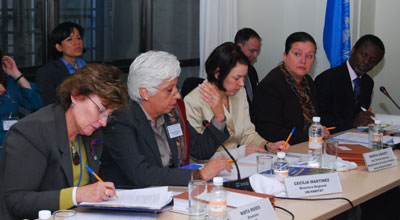Regional UN Officials Strengthen Commitment to Reinforce Interagency Cooperation
Organizations and agencies in the region highlighted the joint work to assess Latin America and the Caribbean's progress towards the fulfillment of the Millennium Development Goals. An interagency report will be launched in July.

(18 February, 2010) The Regional Coordination Mechanism for Latin America and the Caribbean of the United Nations system concluded a two-day meeting in Mexico City today, stressing their commitment to strengthen interagency cooperation to address the development challenges of the region.
Ten years after the Millennium Declaration, representatives from several United Nations organizations and agencies highlighted the coordination efforts made in the assessment of the Millennium Development Goals (MDG) in Latin America and the Caribbean.
An interagency report about the region's progress towards the fulfillment of the MDGs will be launched in July this year.
Climate change, the reconstruction of Haiti after the earthquake, as well as the political situation of the region and the contribution of the United Nations to the regional cooperation were also discussed.
The meeting was presided by the Deputy Secretary-General of the United Nations, Asha-Rose Migiro, and coordinated by ECLAC Executive Secretary, Alicia Bárcena, at the Economic Commission for Latin America and the Caribbean subregional headquarters in Mexico.
The Secretary-General of the Organization of American States (OAS), José Miguel Insulza, was the keynote speaker during this second day of sessions. In his presentation, he shared his vision of what he considers to be the main three challenges facing the region today: sustainable growth, real integration and a better rule of law.
The Regional Coordination Mechanism was established by resolution of the United Nations Economic and Social Council (ECOSOC) in 1998. It is coordinated by the United Nations regional commissions and chaired by the U.N. Deputy Secretary-General, and aims to promote the consistency of United Nations activities in each region.
In addition to ECLAC, representatives of the following bodies participated in the meeting: the International Labour Organization; the Pan American Health Organization; the Food and Agriculture Organization; the United Nations Educational, Scientific and Cultural Organization; the United Nations Population Fund; the Joint United Nations Programme on HIV/AIDS; the United Nations Human Settlements Programme; the United Nations Office for Project Services; the United Nations Development Fund for Women; the United Nations Environment Programme; the World Food Programme; the United Nations Development Programme and the United Nations High Commissioner for Refugees.
Also participating were the OAS, the Inter American Development Bank and top Mexican government officials.
For more information, contact ECLAC's Information Services. Email: dpisantiago@cepal.org ; telephone: (56-2) 210-2040/2149.
Related content
Top United Nations Officials Discuss Climate Change, Millennium Goals and Political Situation in the Region
The Meeting of the Regional Coordination Mechanism of the United Nations system gathers the main organizations and agencies in the region.